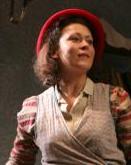SEARCH
REVIEWS
FEATURES
NEWS
Etcetera and
Short Term Listings
LISTINGS
Broadway
Off-Broadway
BOOKS and CDs
OTHER PLACES
Berkshires
London
LA/San Diego
Philadelphia
Elsewhere
QUOTES
On TKTS
LETTERS TO EDITOR
FILM
LINKS
MISCELLANEOUS
Free Updates
Masthead
Writing for us
A CurtainUp  London Review
London Review
 London Review
London ReviewMen Should Weep
by Neil Dowden
|
A we've din wrong is tae be born intae povert!
---- John Morrison |

Pauline Turner as Maggie Morrison
(Photo: John Haynes) |
It is a bit of a mystery why such a highly rated play has been performed so rarely. It may partly be because Stewart's social-realist style of drama went out of fashion, but partly perhaps because the Glaswegian working-class dialect in which the dialogue is written is not necessarily easy for non-Scots to understand. I have to say, as a southern Englishman, I missed a lot of what was being said but nonetheless the strengths of the play shine through in Charlotte Gwinner's exemplary production.
The drama centres on a family's struggle for survival during the Great Depression of the 1930s, in the notorious Glasgow Gorbals, at that time one of the worst slums in Europe, riddled with poverty, disease, violence and crime. But ultimately this is a celebration of the human spirit triumphing over adversity, as embodied in the main protagonist, Maggie Morrison (Pauline Turner), a sort of Mother Courage of the tenements, who holds her extended family together through sheer strength of character.
Maggie, a cleaner and mother of seven, has to contend with her unemployed husband John (Paul Hamilton), who won't do "lassies' work" in the house; son Alec (Mark Wood), who drinks and is in trouble with the police; teenage daughter Jenny (Natasha Broomfield), who is getting a reputation for loose morals; and her youngest child Bertie, who has TB. Not to mention a constantly grumbling mother-in-law (Jennifer Piercey), self-righteous sister Lily (Joanne Howarth) who gives them handouts, and prying neighbours!
Kitchen-sink drama a decade before Osborne, Wesker et al., Men Should Weep is a truly remarkable work not only because of the authentic voice it gave to working-class people, who were either caricatured or marginalized in previous drama, but because of its strong female characters. In fact, the feminist subtext comes across more powerfully than the socialist agenda, which is implied rather than overt, as the play shows the devastating consequences of poverty on family life.
Though the subject-matter is suffering, the play is by no means all gloom and doom, as the oppressiveness of the scenario is relieved by a surprising amount of comedy, shafts of light which enable the characters to cope with their difficulties. With its combination of claustrophobic intensity and stoical humour, Men Should Weep bears comparison with Sean O'Casey's 1920s trilogy of tenement life in Dublin.
Michael Taylor's beautifully detailed set design, with lines of washing hanging above the stage, gives an authentic impression of the cramped and decrepit housing conditions in which the Morrison family lives.
Pauline Turner brings a certain nobility to the matriarchal Maggie but also shows her vulnerability when she eventually loses her temper and breaks down in tears. Paul Hamilton's John suggests a strong sense of both anger and shame, as he feels emasculated in being unable to feed his family properly. Joanne Howarth shows there is warmth behind Lily's preachiness when she stands up for her sister, while Jennifer Piercey makes Granny's irritating self-pity very funny. This is a first-rate ensemble production.
|
MEN SHOULD WEEP
Written by Ena Lamont Stewart Directed by Charlotte Gwinner With: Pauline Turner, Jennifer Piercey, Joanne Howarth, Paul Hamilton, Natasha Broomfield, Mark Wood Design: Michael Taylor Lighting: Chris Davey Sound: David McSeveney Running time: 2 hours 5 minutes including one interval An Oxford Stage Company production Link to OSC website http://www.oxfordstage.co.uk/ Box Office: 020 8985 2424 Booking at Hackney Empire until 1st October 2005 and then Devonshire Park Theatre Eastbourne 11th to 15th October, Chelmsford Civic Theatre 18th to 22nd October, Dundee Rep 25th to 29th October and Oldham Coliseum 31st October to 5th November. Reviewed by Neil Dowden based on 27th September performance at the Hackney Empire, 291 Mare Street, London E8 (Train: London Fields from Liverpool Street) |





